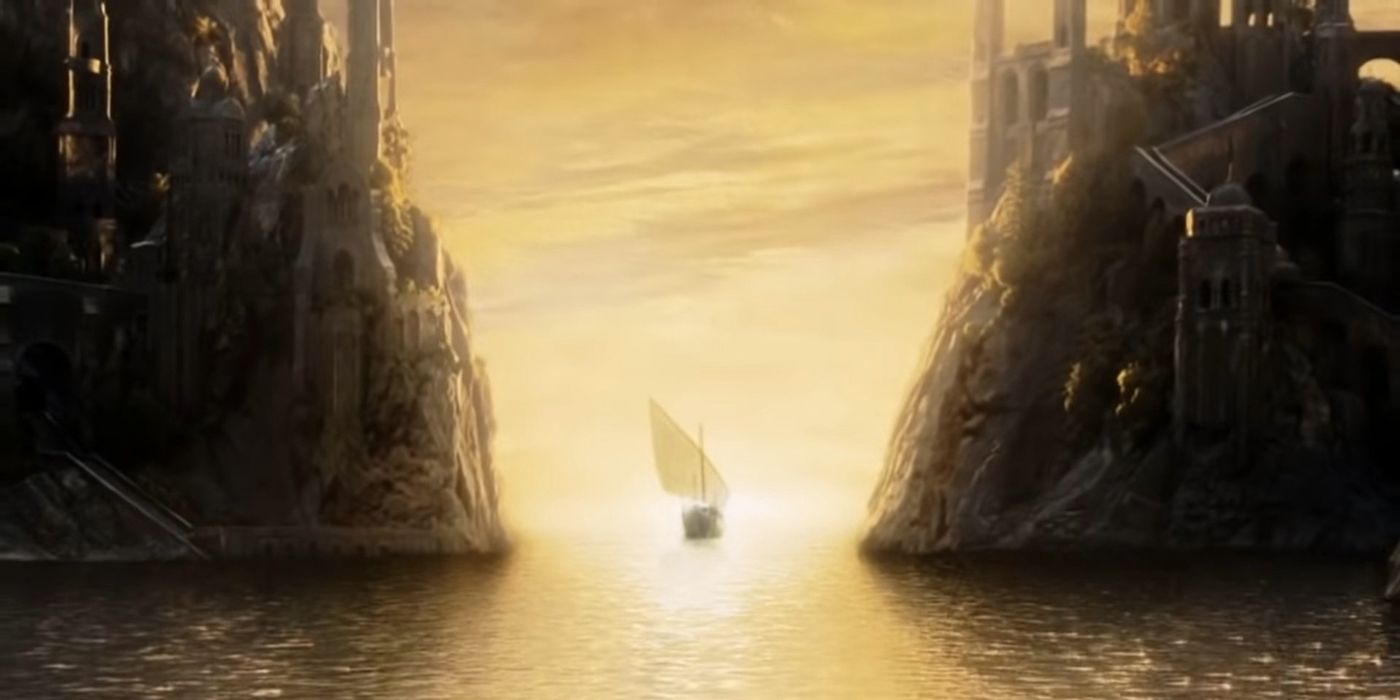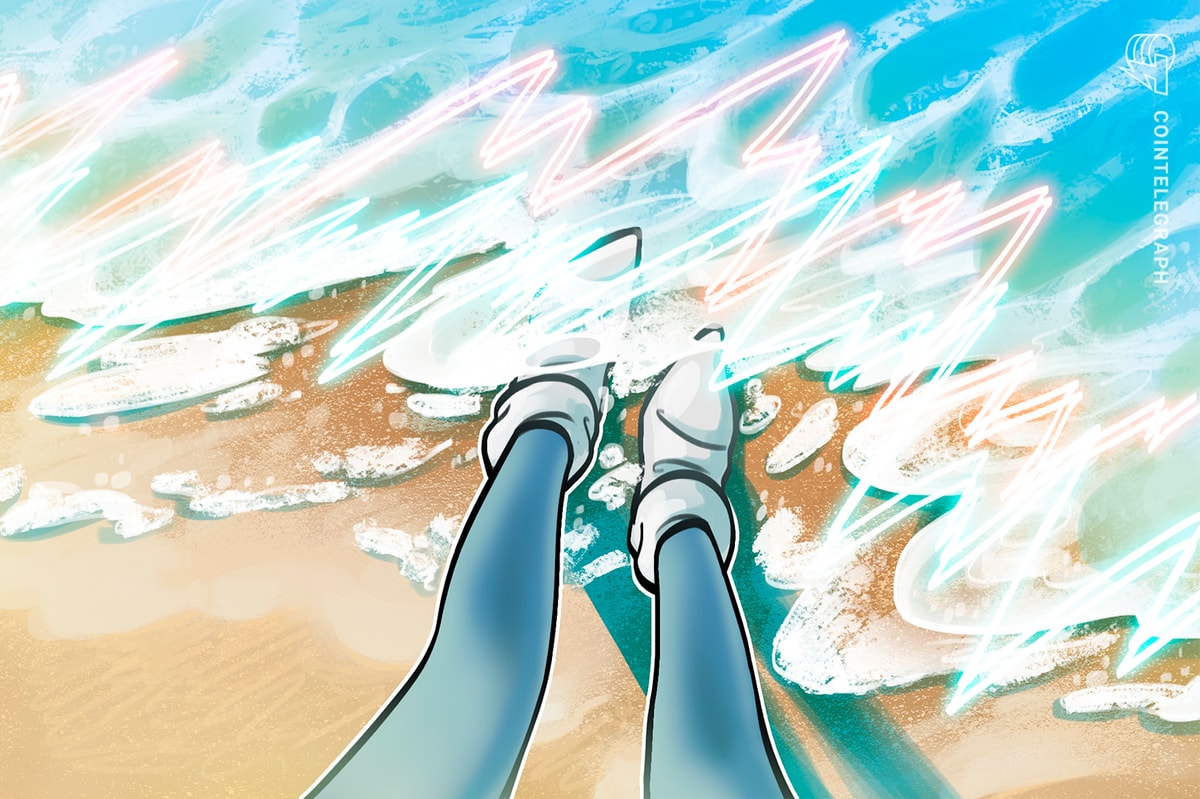One of the most interesting debates in The Lord of the Rings lore is about who gets to go to the Undying Lands, especially after the end of The Lord of the Rings: The Return of the King. Bilbo (Ian Holm), Frodo (Elijah Wood), and Sam (Sean Astin) all get to go with Gandalf (Ian McKellen), followed by Legolas (Orlando Bloom) and Gimli (John Rhys-Davies) later on, but Merry (Dominic Monaghan), Pippin (Billy Boyd), and Aragorn (Viggo Mortensen) are never allowed to sail into the West. Especially in Aragorn's case, this seems a little unfair, given his crucial role in the Fellowship of the Ring, but it actually makes a lot of sense in his story that he stays in Middle-earth.
The Ring-Bearers and Gimli Were Exceptionally Allowed Into Valinor
 Via New Line Cinema
Via New Line Cinema
Normally, only Elves and the Ainur are allowed into the Undying Lands. Elves, in fact, have an inherent right to make the journey, and the War of the Ring effectively ends their power in Middle-earth, so, unless they go into the West, they will simply fade into non-existence. This is why Legolas has to go, for example. Dwarves aren't usually allowed, but Gimli is a very special case. His friendship with Legolas and deep admiration for Galadriel (Cate Blanchett) begin to mend relations between these two races, leading the Valar to make an exception for him, also considering his role as a hero of Middle-earth.
Bilbo, Frodo, and Sam are completely different cases altogether. The three of them all have carried the One Ring at some point, and this left a mark on their bodies and spirits that simply could never heal completely in Middle-earth. Their journey into Valinor is a reward for their deeds, but it is primarily about healing, so they can live free from the pain and weariness inflicted by the One Ring. The three Ring-bearers and Gimli all eventually die, too, as the Undying Lands do not grant immortality; they simply live out the remainder of their lives in peace.
Aragorn Remaining in Middle-Earth Is Tied to the Fate of Men
Mortality is one of the central themes J.R.R. Tolkien explores in The Lord of the Rings, and each race has a unique relationship with this concept. Elves, for example, are immortal, so their fate is tied to the fate of Arda (the world) until its end. Men, on the other hand, are mortals, and their spirits go to a place beyond Arda upon their deaths, the nature of which is a mystery even to Elves. Tolkien called this the Gift of Men given by Eru Illúvatar (the equivalent to God in Tolkien's Legendarium).
Aragorn's story has always been tied to his role as a leader of Men and, therefore, a mortal, so he was always bound to the Fate of Men. His whole arc is about reconciling with his role as a man destined for greatness, but still a man. This is why, for example, he lets Frodo go in The Fellowship of the Ring, recognizing that Men can't resist the temptation of the One Ring. The same reasoning is applied to accepting his own mortality. Aragorn never dreads it, but fully embraces it instead, understanding that death is a divine blessing, not a curse. As a Dunedáin, he has a longer lifespan, but, despite his Elvish upbringing, never seeks to cheat death or prolong his existence in any way.
Eventually, Aragorn dies peacefully on his own terms, much like the Numenórean kings of old. By then, he had accomplished incredible things and lived such a remarkable life that perhaps the Valar would have allowed him entry into Valinor, but his remaining in Middle-earth and eventually accepting death isn't a tragedy but a fulfillment of his destiny. It embodies Tolkien’s view that mortality isn't a curse, but a unique and sacred gift to humans.
Aragorn’s Role in Middle-Earth Continues After the War of the Ring
Sauron's defeat at the War of the Ring marks the end of the Third Age of Middle-earth. It was a long period in which the Light of the Eldar continued to fade, while Men took a larger role in political affairs. The Fourth Age, then, is the Age of Men, who become the most powerful race in Middle-earth upon the Elves' departure. What marks the beginning of the Fourth Age is Aragorn becoming the High King of Gondor and Arnor. It is important that he be the king, symbolizing the transition from the rule of Elves to Men.
As the new king of Gondor and Arnor, Aragorn (who ruled as King Elessar) rules over most of the western part of the continent, seeking to rebuild everything that was destroyed in the wars against Sauron in the Second and Third Ages. His rule isn't about power, but actually about healing Middle-earth and bringing strength and stability to the realms of Men. He also consolidates his legacy by preparing his son with Arwen (Liv Tyler), Eldarion, to continue his work and strengthen this legacy of peace. Aragorn going to the Undying Lands would mean betraying everything he accomplished even on a personal level, seeing how Arwen chose a mortal life to be with him.
Another important symbolism in Aragorn's rule is his Numenórean heritage. In the Second Age, the realm of Númenor rebelled against the Valar and attempted to invade Valinor, seeking immortality, resulting in the banning of all mortal beings from Aman. Aragorn sees himself as the last of the Numenóreans, and his accepting the Fate of Men means correcting this mistake towards the Valar, dying with dignity and on his own terms when the time comes.










 English (US) ·
English (US) ·